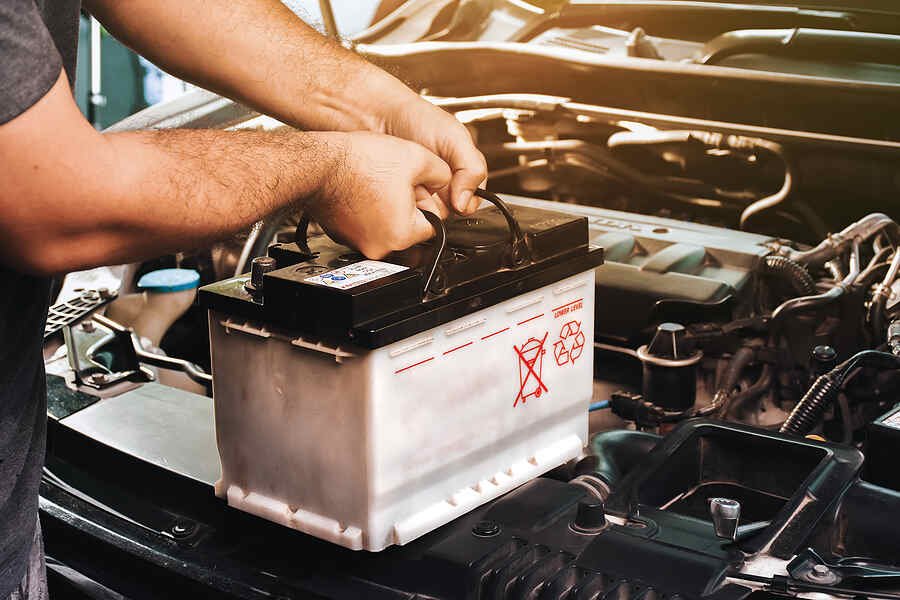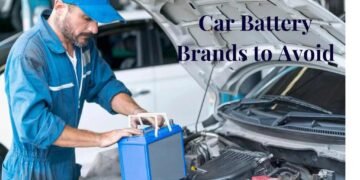Automotive batteries are a vital component used in modern vehicles. There are various types of batteries available that are used in automotives. These units power a vehicle’s lights, engines, radiator, AC and other components. However, Automotive batteries contain hazardous materials that can damage human health and the environment.
Hazard class is categorized depending on the battery type. This specification is mainly regulated by EPA (Environmental Protection Agency) and DOT (Department of Transportation). Most modern vehicles carry lead-acid batteries that come under hazard class 8. These power units contain sulfuric acid that damages human skin and increases the corrosion rate in steel.
Similarly, there are other hazardous Automotive batteries available. For example, hazard class 9 refers to lithium-ion batteries. These power cells are also dangerous for miscellaneous substances. But Why Does Hazard Class Matter to You? What are the hazardous classes of automotive batteries and potential damages from them? Discussed in this article.
Hazard Class of Automotive Batteries
The majority of Automotive batteries are classified as hazard class 8. These power cells contain Corrosive materials or lead acidic components. Government authorities, including the United States Department of Transportation (DOT), International Air Transport Association’s (IATA) Dangerous Goods Regulations (DGR), and EPA, consider these batteries dangerous for both humans and the environment.
Hazard class 8 automotive batteries cause chemical action that damages living tissues and causes corrosion. If the substances come into contact with the eyes and skin, they can lead to burning or irritation problems.
Similarly, hazard class 9 automotive batteries are used in hybrid or electric vehicles. These power cells are considered Miscellaneous dangerous goods with potential risk of fire or explosion. Some other types of batteries are Nickel-metal hydride, Nickel-cadmium, and Lithium-metal batteries. All these power cells also fall under hazard class 9.

Why do Hazard Classes of Automotive Batteries Matter?
Understanding the Hazard classes of automotive batteries help to prevent potential risk to your health and environment. Lead acid batteries are the standard type of power cells in vehicles. These units carry hazardous materials such as sulfuric acid, which leads to corrosion of steel, causing burning and other injuries. On the other hand, Lithium-ion batteries also risk explosion or fire. By understanding their Hazard classes, you can safely handle and dispose of these batteries.
Additionally, you must follow government regulations that determine the transportation, storage, and disposal of these hazardous materials. By knowing Automotive battery hazard classes, you can comply with government regulations and avoid fines or penalties. Remember, Incorrect handling or disposal of Automotive batteries can lead to shipping delays, jail, or cancellation of shipping rights. That’s why it is essential to specify Automotive batteries hazard classes to meet DOT and EPA requirements.

Potential Hazards Posed by Automotive Batteries
Automotive batteries contain hazardous substances, including lead, sulfuric acid, and other chemicals. Exposure to these chemicals can lead to several health and environmental problems. Below are the Potential Hazards Posed by Automotive Batteries.
Chemical hazards
Automotive batteries contain sulfuric acids, recognized as highly corrosive materials. Slight contact with this chemical can cause burning or irritation in your eyes, nose, or skin. Additionally, this compound tends to burn or explode when installed or removed in harsh climates.
Physical exposure
You should know that lead is a toxic metal that can cause serious health problems. Most hazard class 8 automotive batteries contain lead acid chemicals. Dust from this compound accumulates in the body and causes neurological damage, anemia, and other health problems.
Environmental hazards
Automotive batteries also affect the environment or ecosystem. Spilled battery acids can pollute soil and water rapidly. In the future, it can harm plants, animals, and humans.
Regulatory Framework for Automotive Batteries
The European Union (EU) posted a new Regulatory Framework for Automotive Batteries. In this article, you can acknowledge various restrictions on these power cells. The global EU officials added Restrictions on mercury, cadmium, and lead usage on batteries. The regulatory framework ensures that 50% lithium should be recovered from waste ion batteries. The article provides restrictions for the transportation of automotive batteries or dangerous goods. There are also many specific requirements for different battery types and hazard classes. If you want to ship Automotive batteries, follow this Regulatory Framework.
- Classify the hazardous materials and label the package with a safety data sheet (SDS). It helps the handler to specify the hazard category.
- Contact authorized hazardous materials carriers for shipping. In the US, four companies are available: FedEx, USPS, UPS, and DHL.
- Review the federal and carrier-specific policies for packaging to ensure several batteries and used materials per pack.
- Clearly label the Automotive batteries with hazardous materials.
- Fill up the necessary shipping documentation.
Proper Handling and Disposal of Automotive Batteries
As we understand, Automotive batteries are hazardous substances that can damage your health. So, following proper handling and disposal processes is essential to minimize risk. Follow the below steps for your safety.
Wear protective equipment
It is vital to wear protective equipment while dealing with hazardous goods. Before installing or removing automotive batteries, equip goggles, fireproof clothes, gloves and other accessories to reduce damages.
Safely store the batteries.
Remember, Automotive batteries contain toxic and high-exposure compounds like sulfuric acid, lead and others. So, keeping these items far from direct sunlight, heat, and flammable materials is essential. Always store batteries in cool and dry places.
Follow correct transportation
For safe transport, use protective, well-sealed and fire proof containers. This packaging helps to reduce the threat of explosion or fire while shipping.
Recycle the batteries
After using Automotive batteries, avoid throwing them anywhere. Instead, you should recycle the battery from the nearest recycling center. These authorized dealers safely dispose of these hazardous goods.
FAQs
Below are the most asked questions related to the topic. Drop down to get your quick answers.
What are automotive batteries an example of?
Automotive batteries are considered recharge power cells that power motor engines and electrical units of a vehicle. These batteries generate electricity by conducting chemical reactions between lead plates and sulfuric acid. You can reuse power cells by passing electricity or recharging them when they die.
Are automotive batteries flammable solids?
Automotive batteries aren’t flammable solids because non-flammable plastics cover the power cells. However, the batteries can cause fire or explosion if they short circuit or overheat.
Which hazardous material is commonly found in vehicle batteries?
Lead and sulfuric acid are common hazardous materials found in vehicle batteries. These power cells fall under hazard class 8 and are considered highly corrosive materials.
What is the most commonly used automotive battery?
Lead-acid batteries are the most commonly used power cells in the automotive industry. These batteries come under hazard class 8 and work to start lighting and ignition in vehicles. Remember, Risk of burning and other health issues are associated with these power cells.
Conclusion
As mentioned, most modern vehicle batteries come under hazard class 9, containing lead-acid materials. Similarly, there are hazard class 9 batteries that are used in electric vehicles. All these power cells are harmful to both humans and the environment. So, it is crucial to follow the proper steps to handle and dispose of these batteries. Otherwise, you can have trouble with shipping, transportation, government policies, and other charges.















